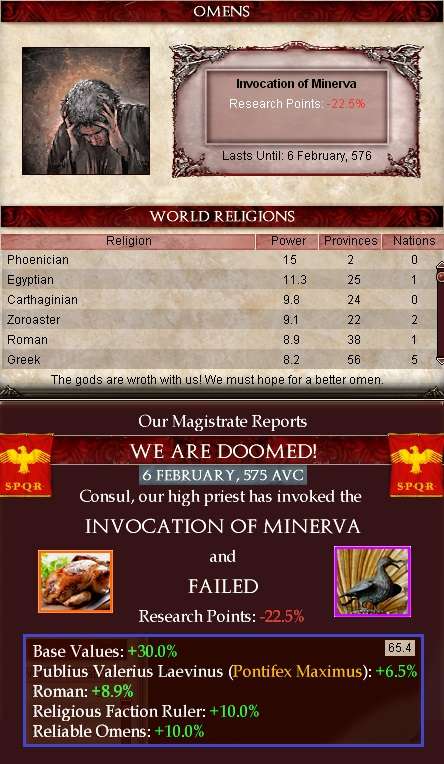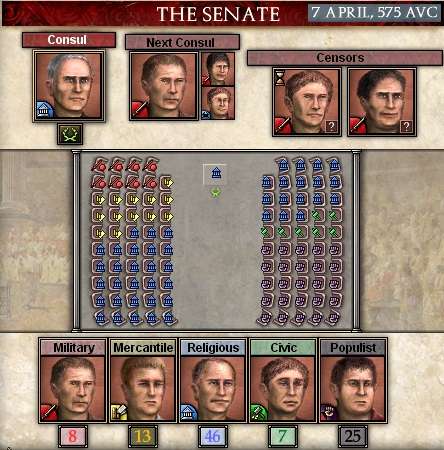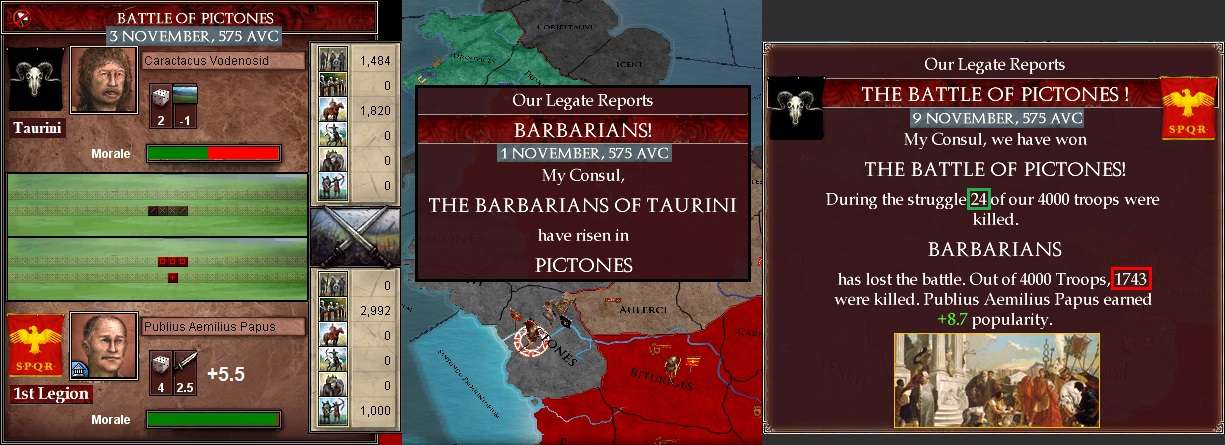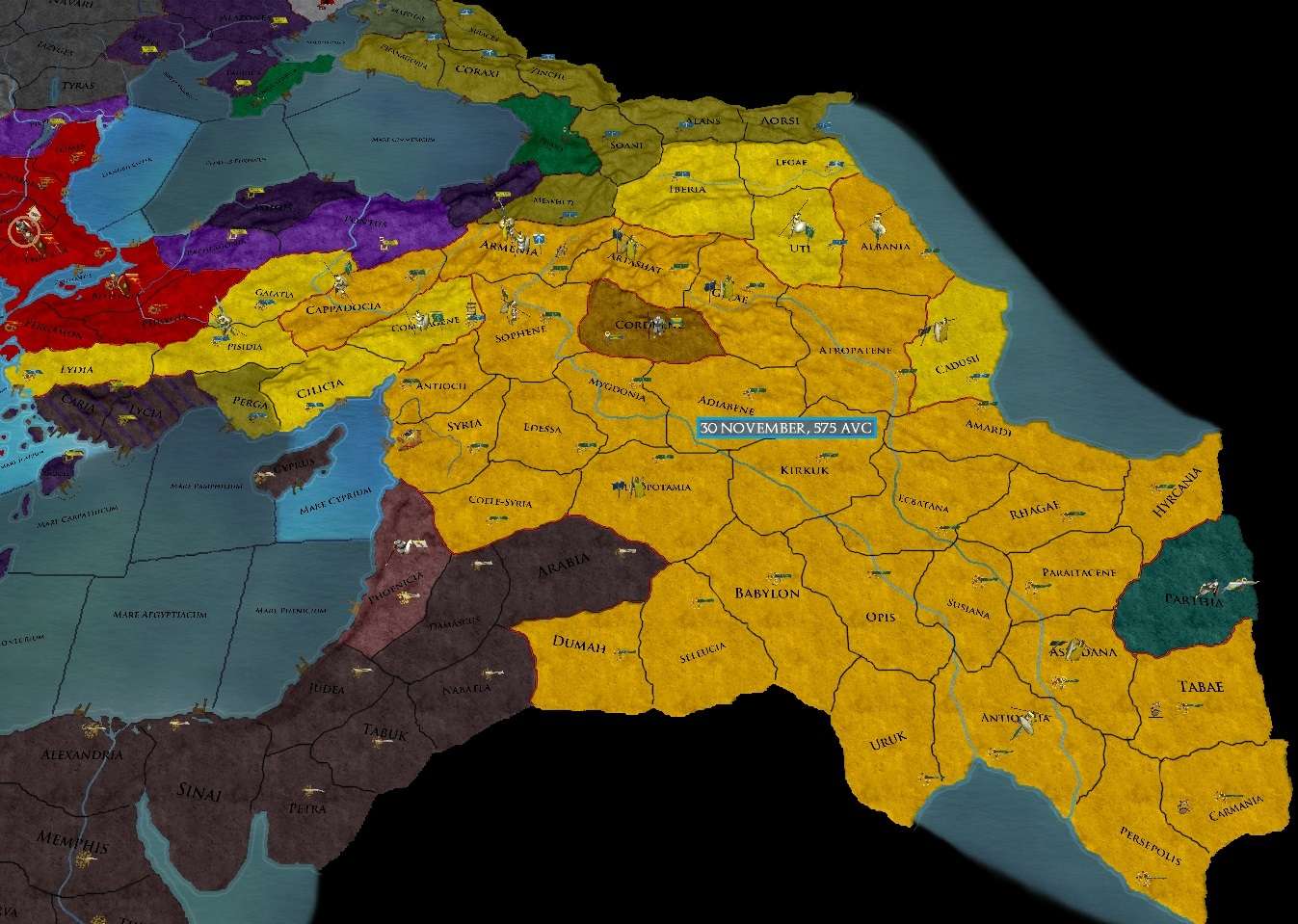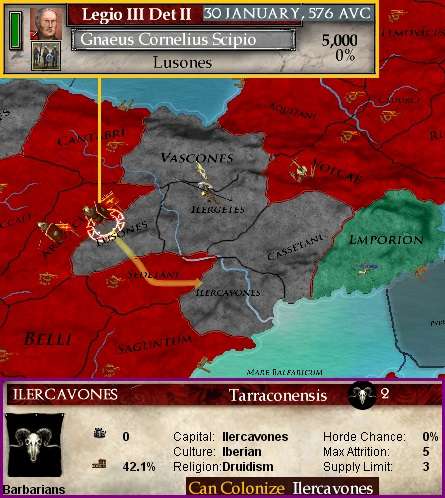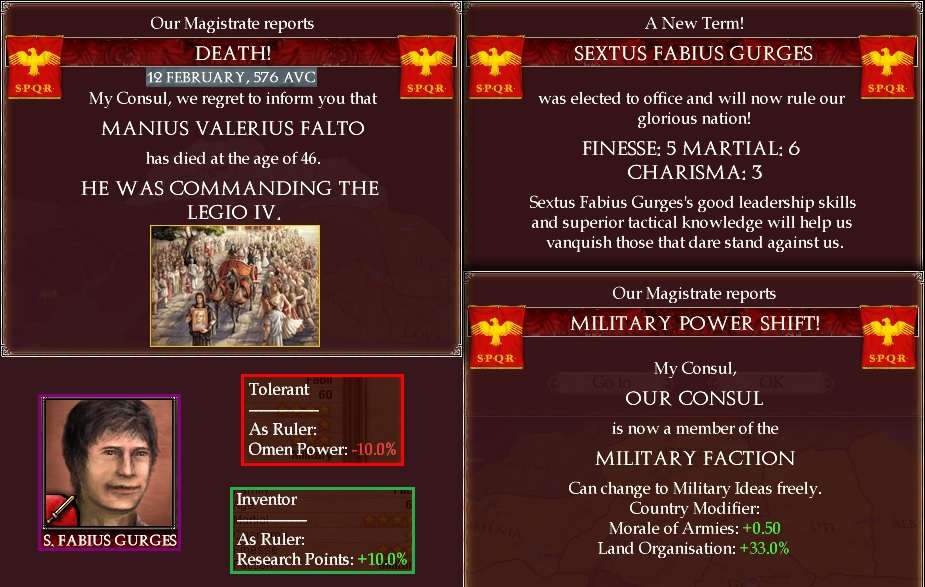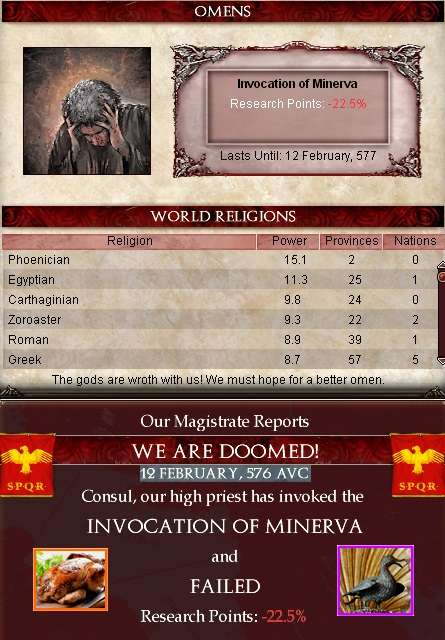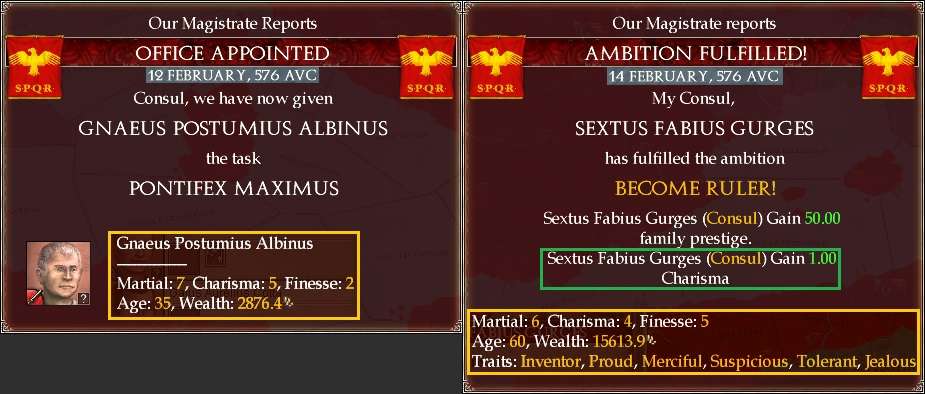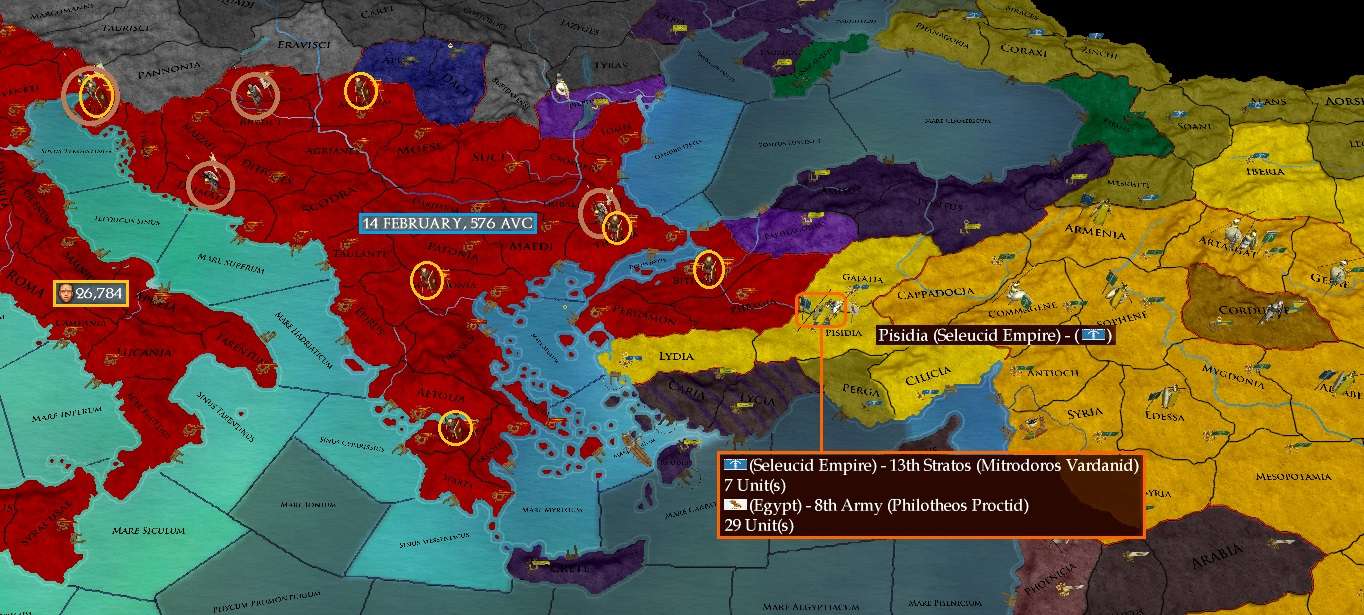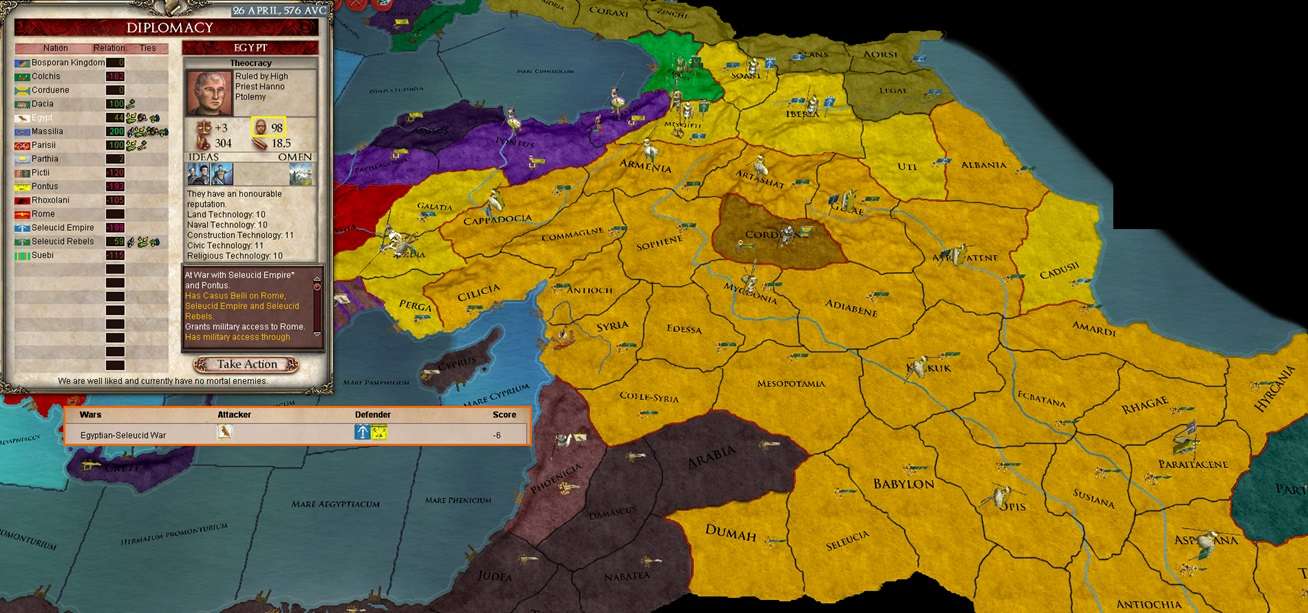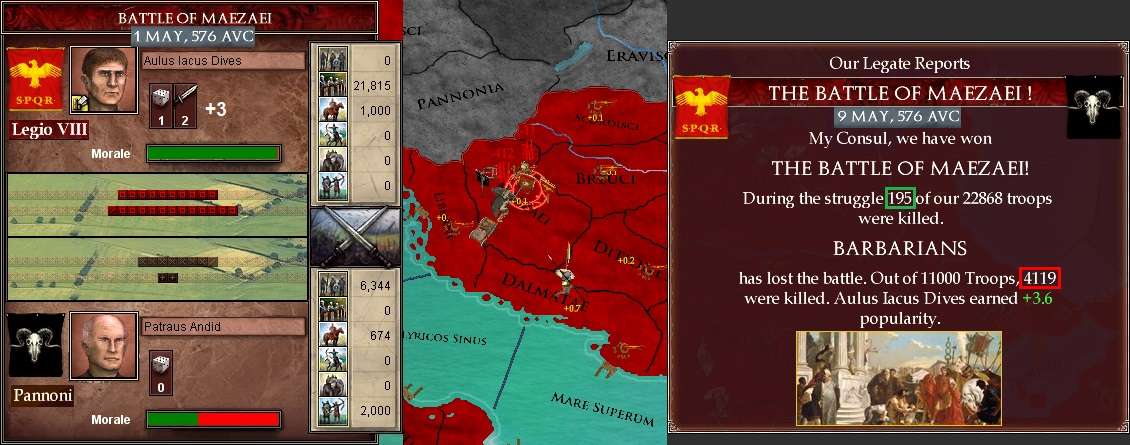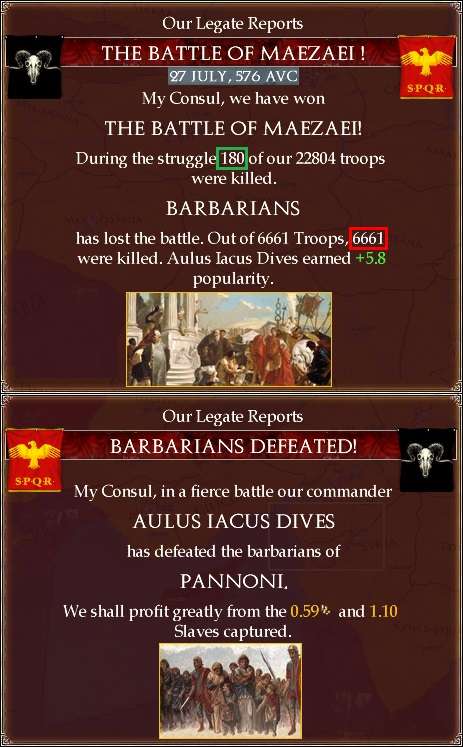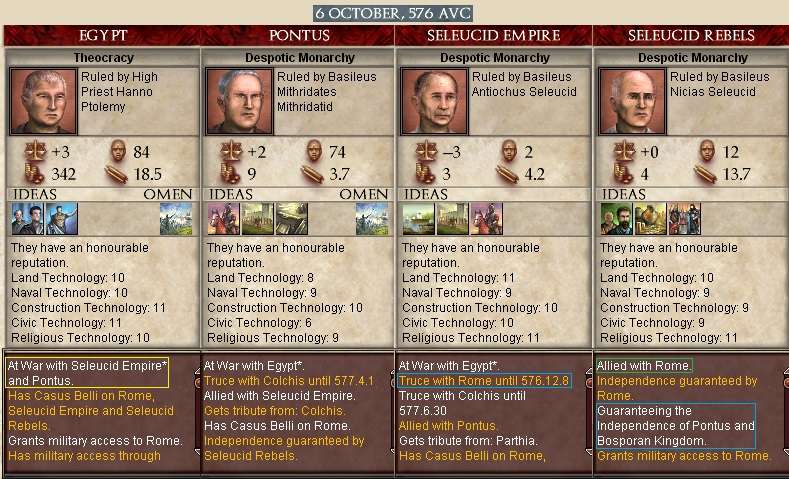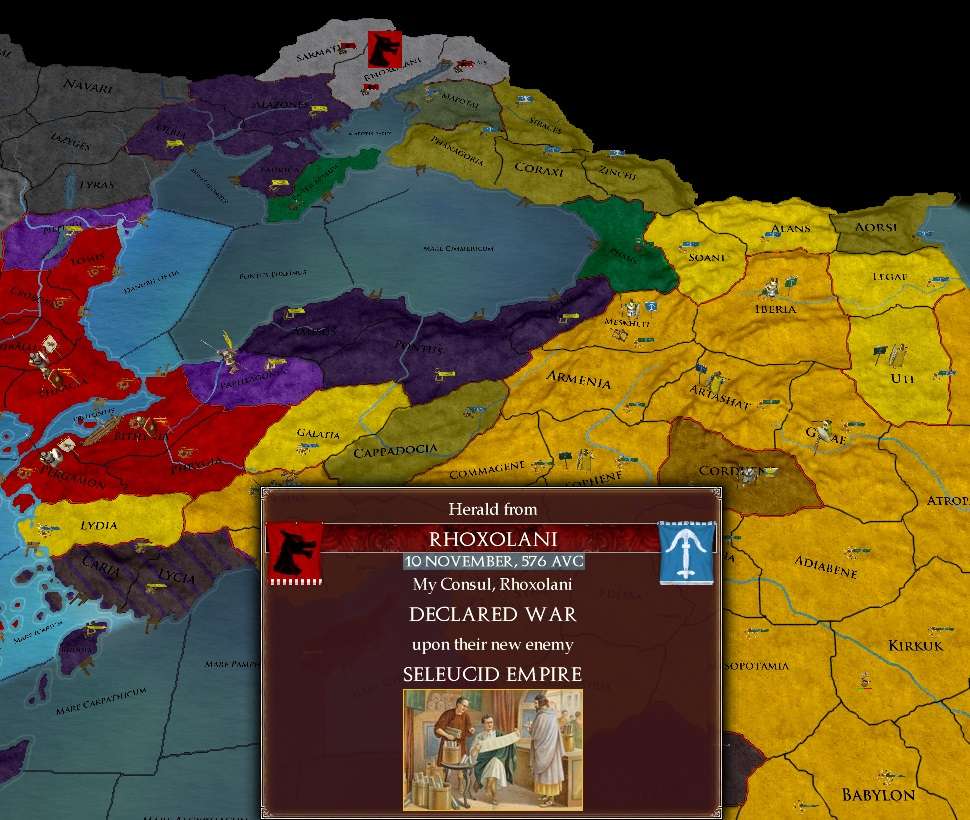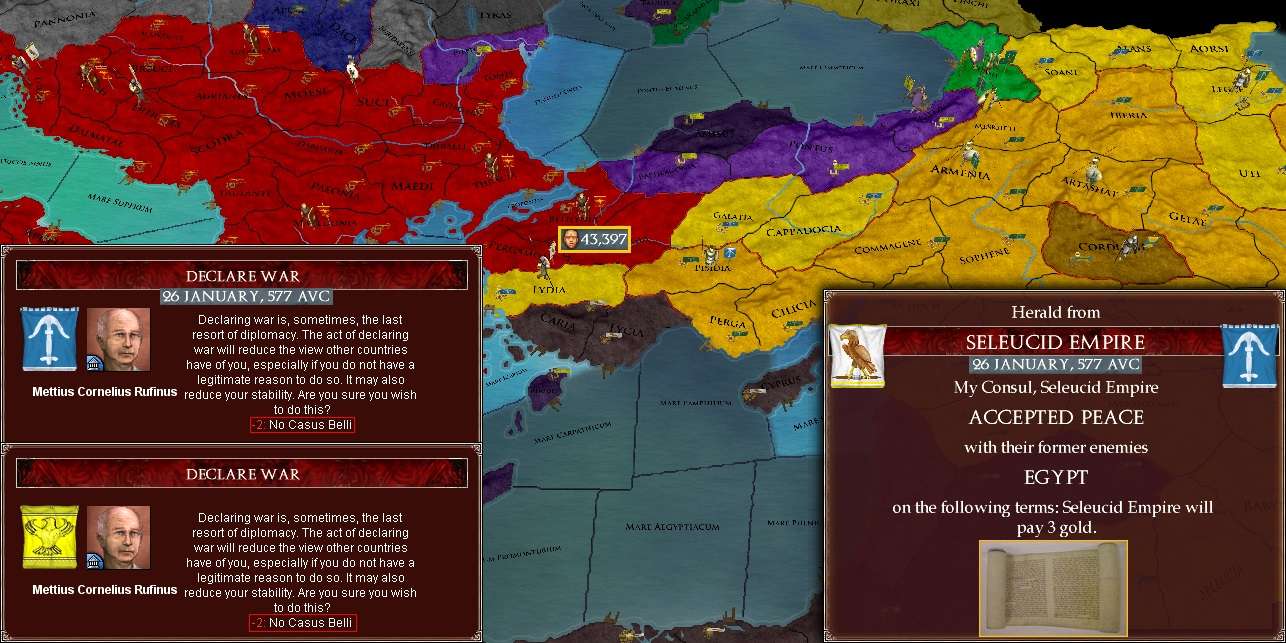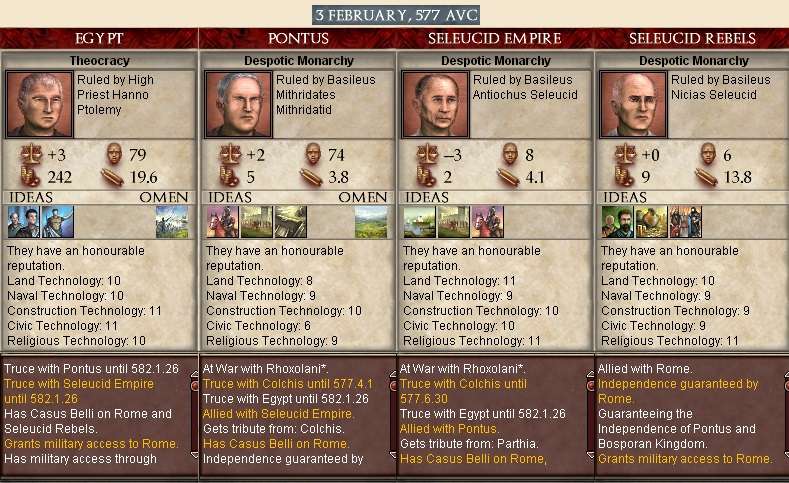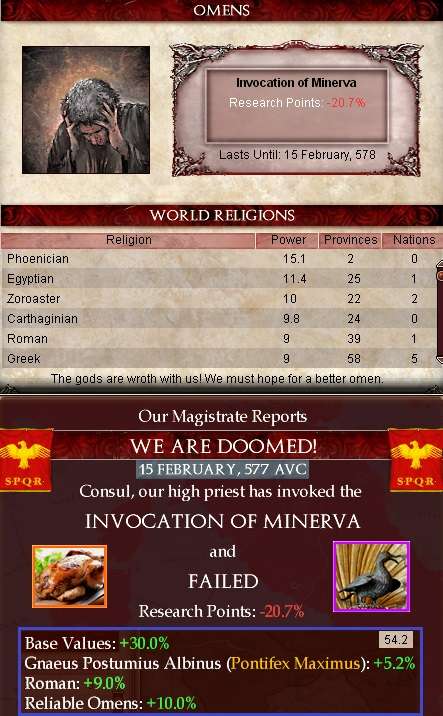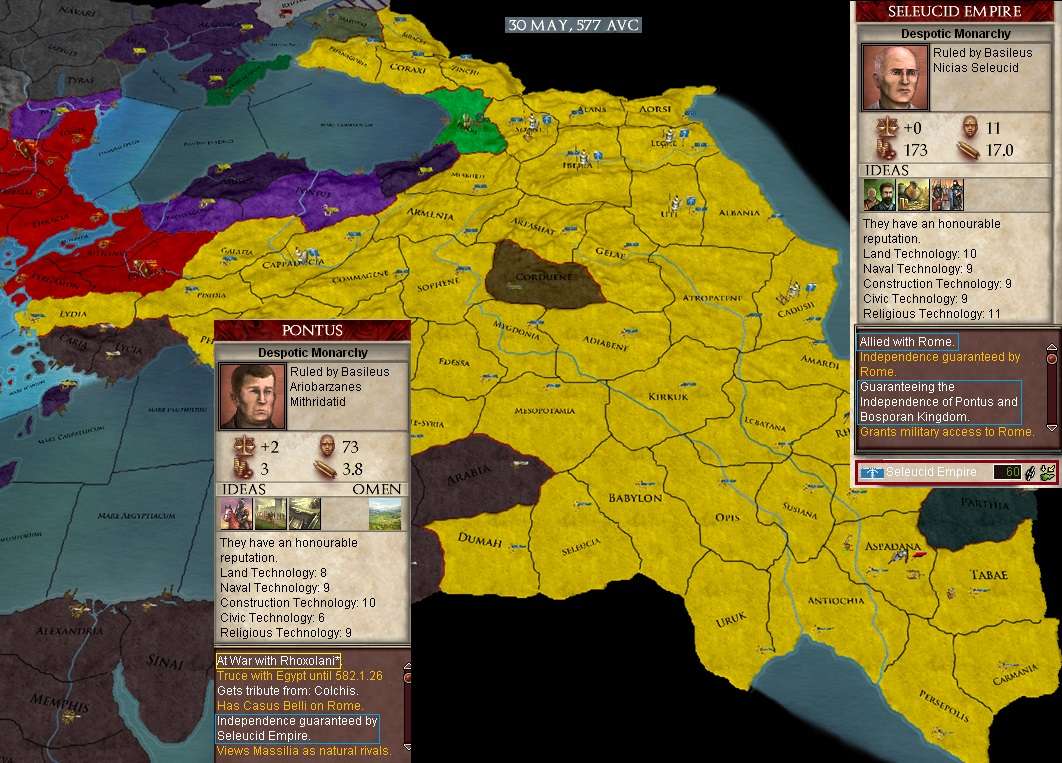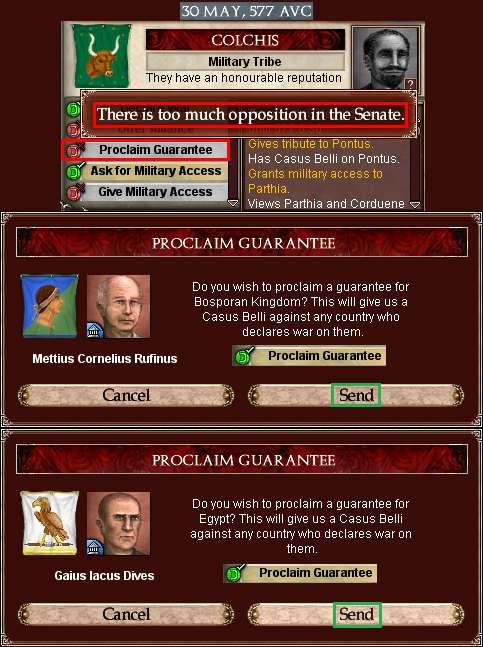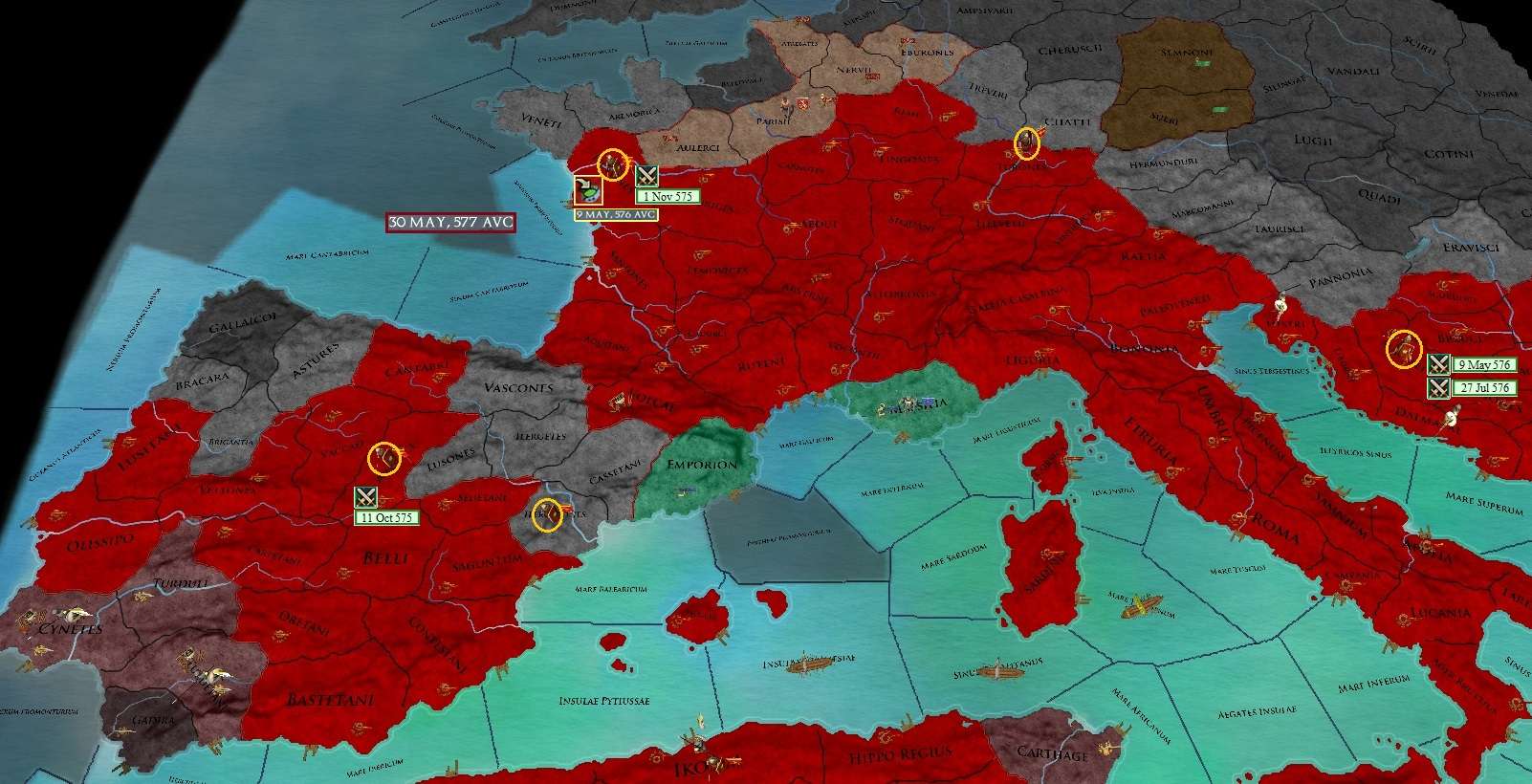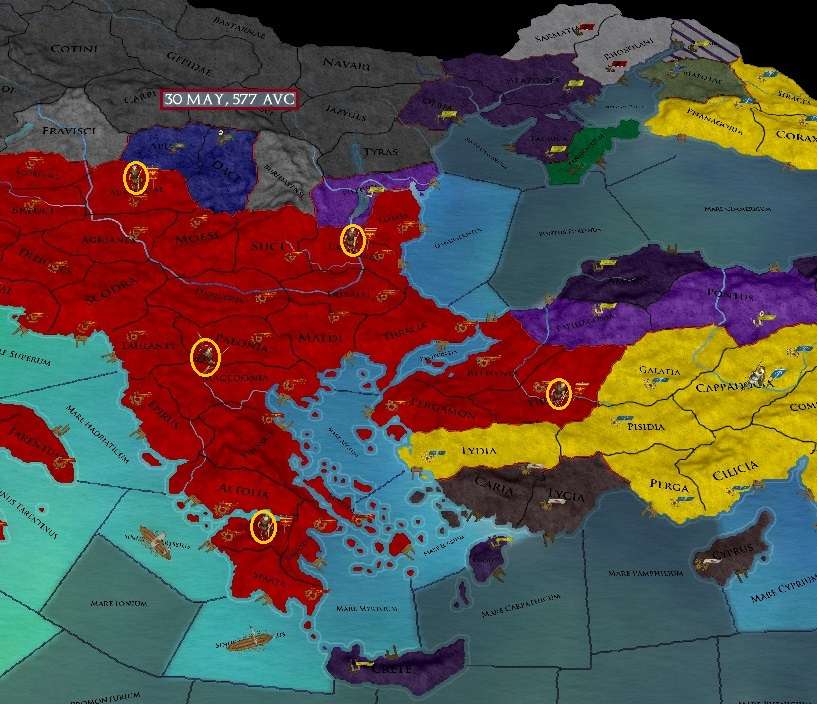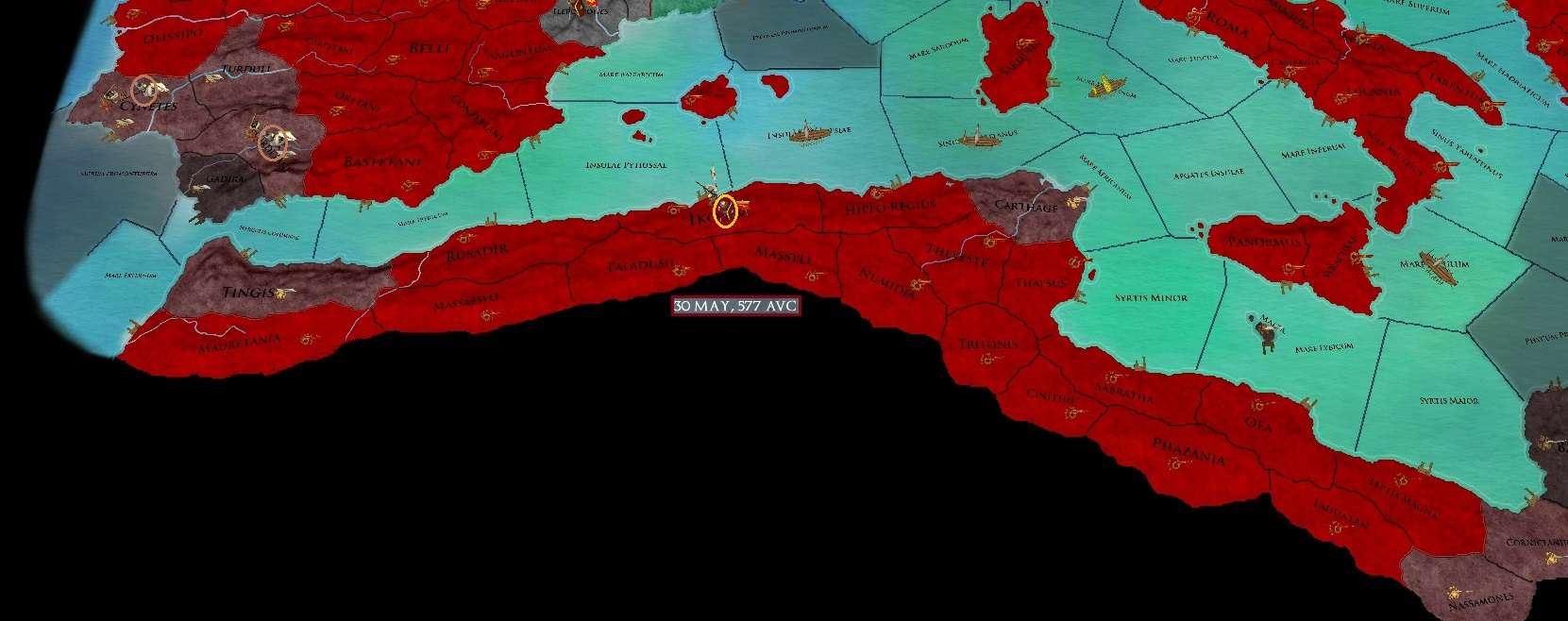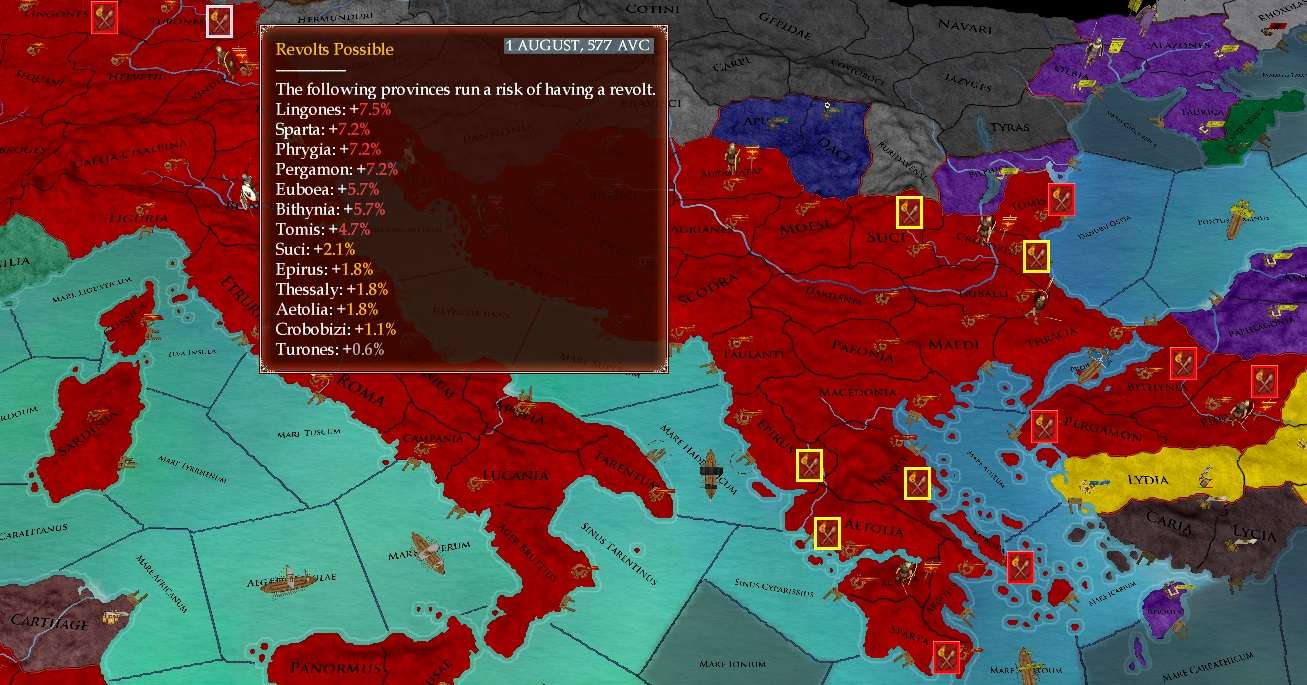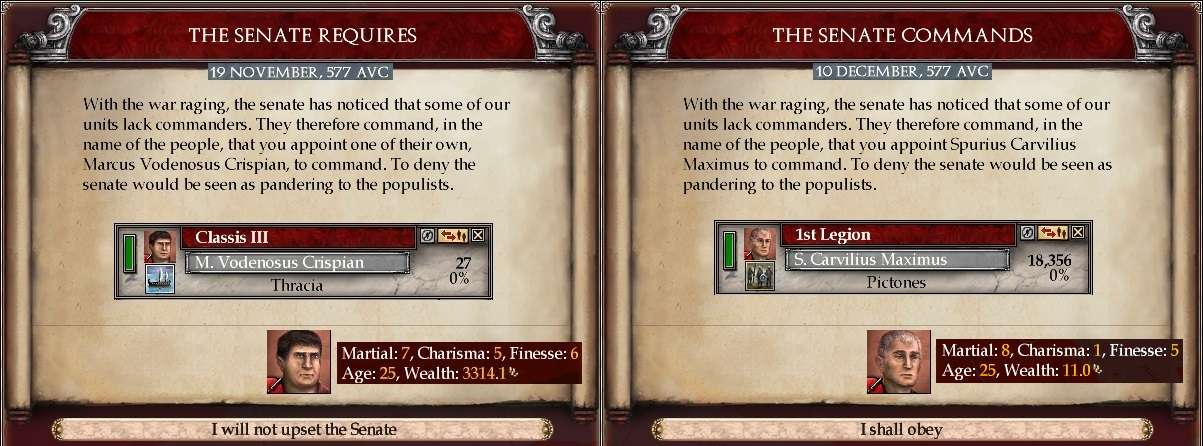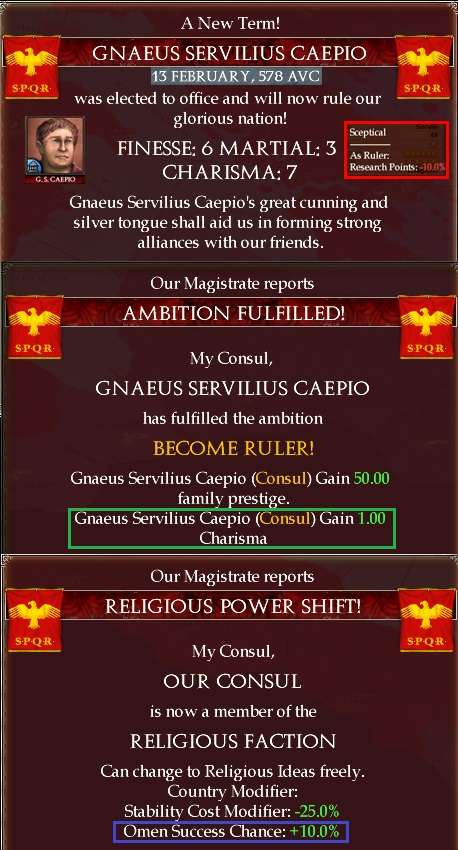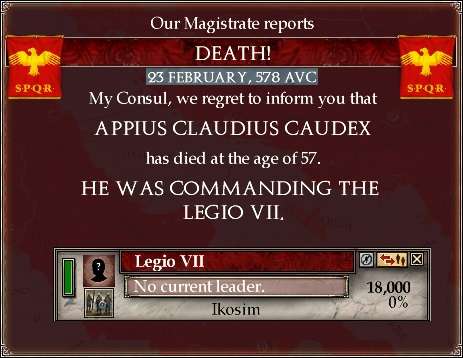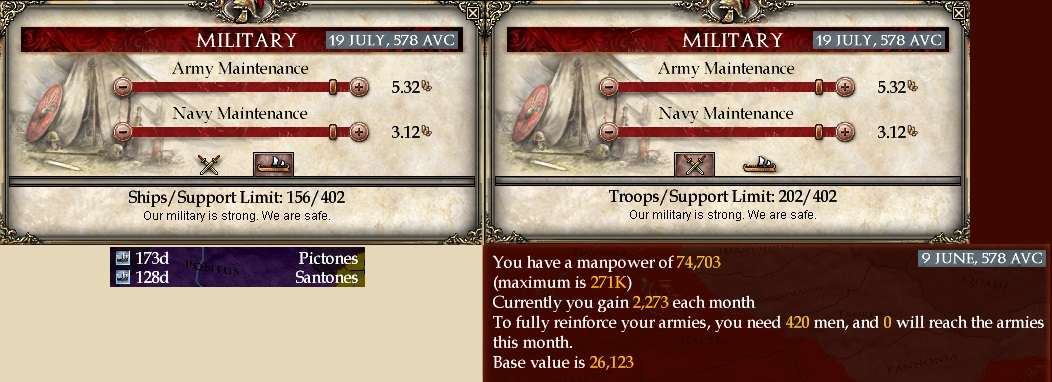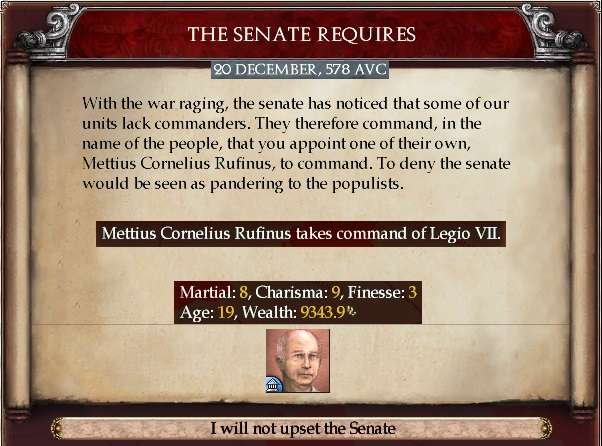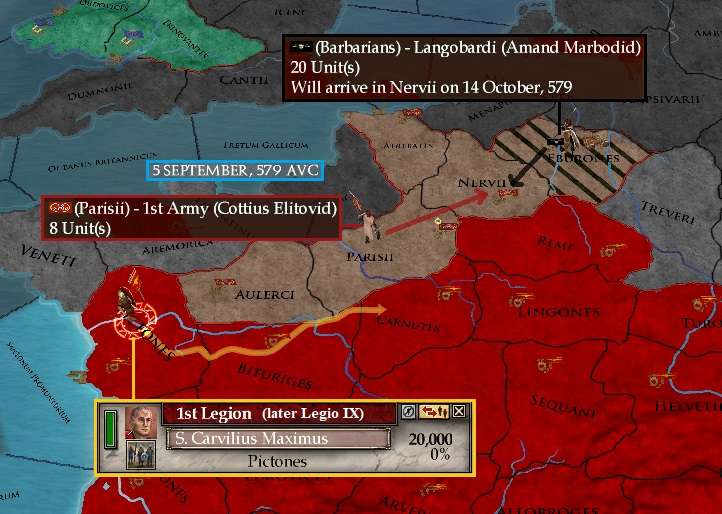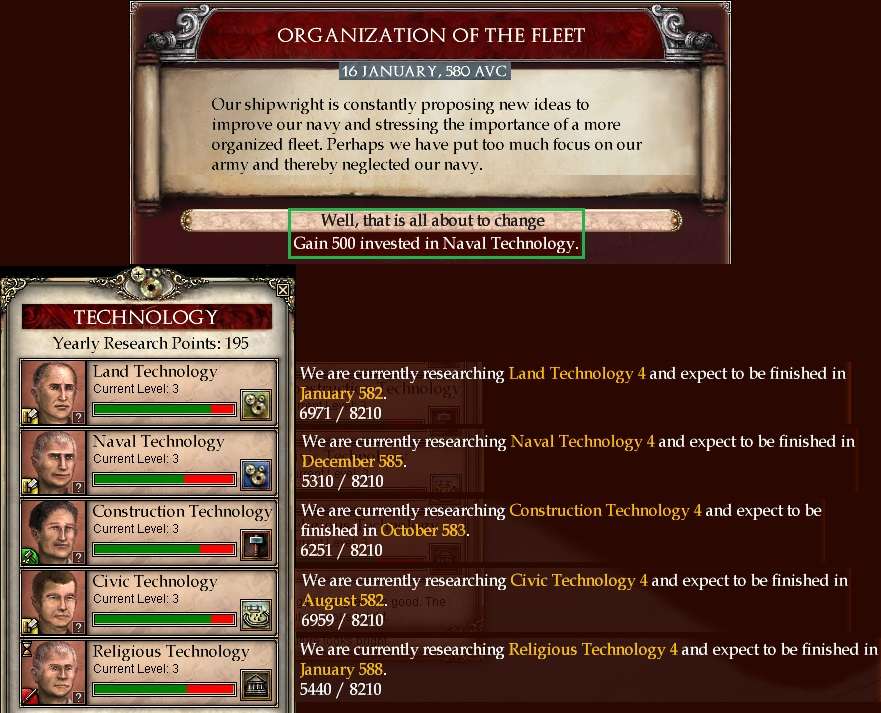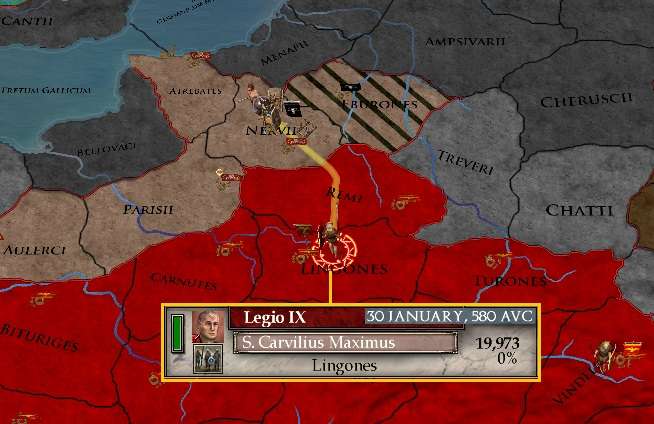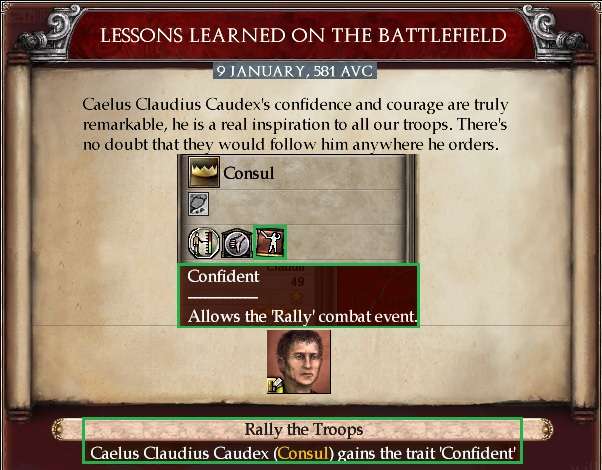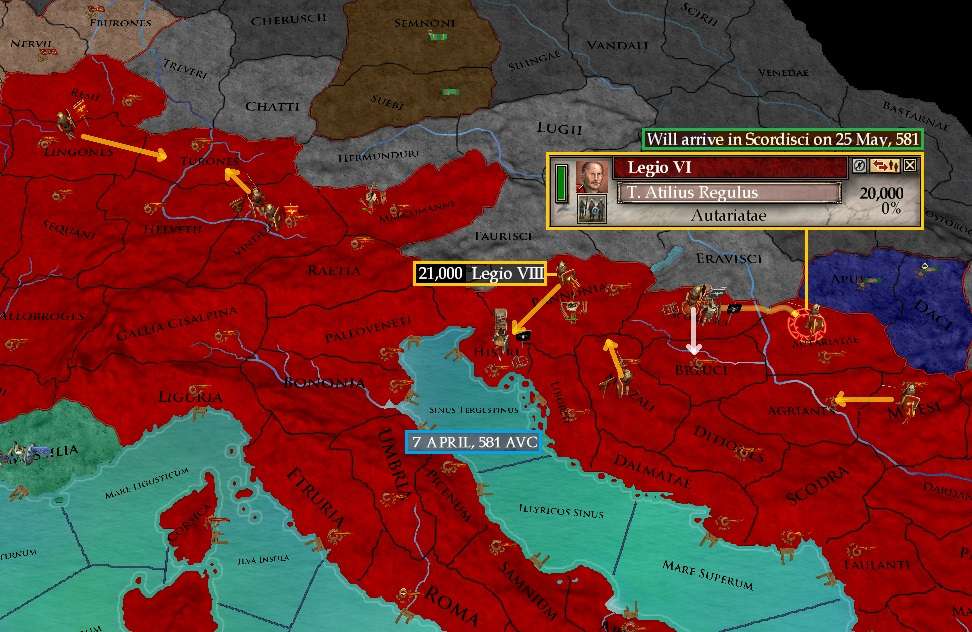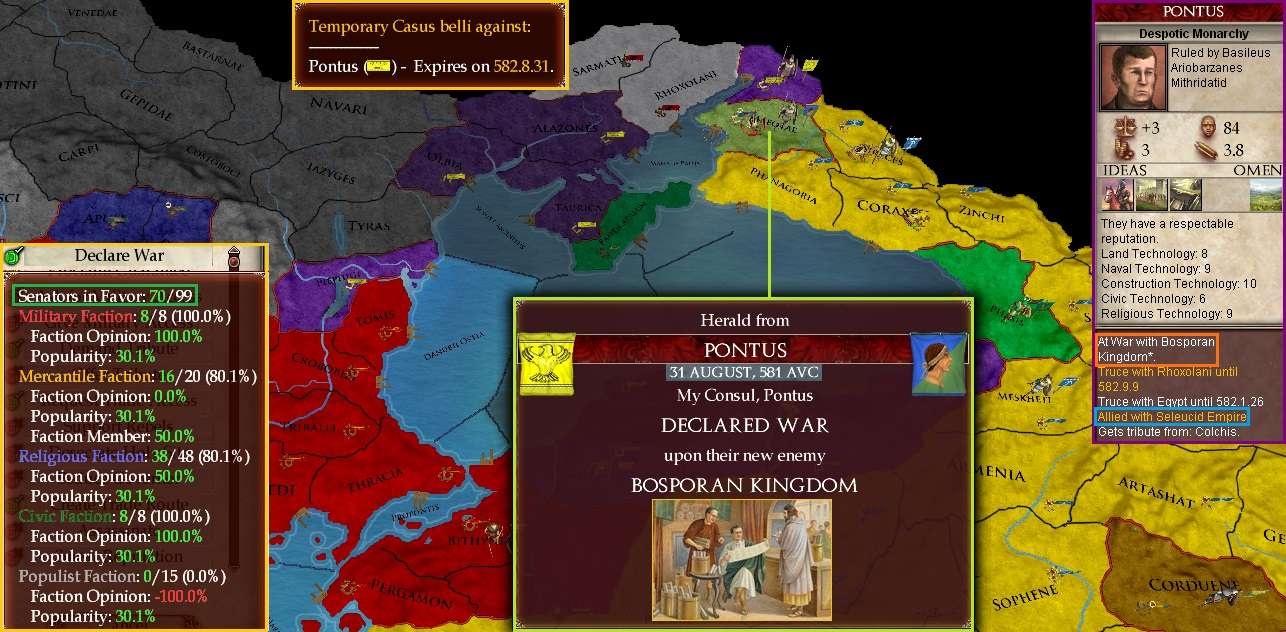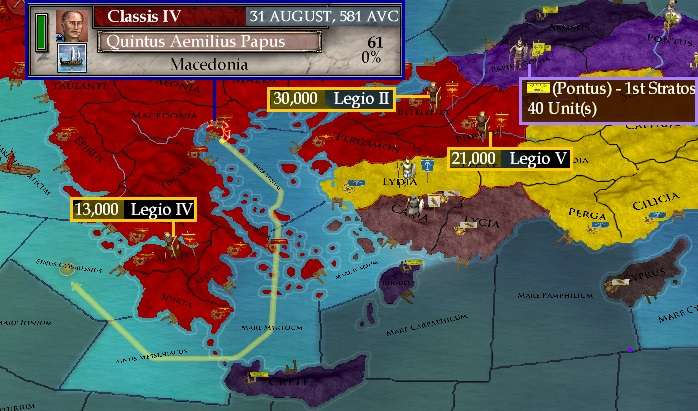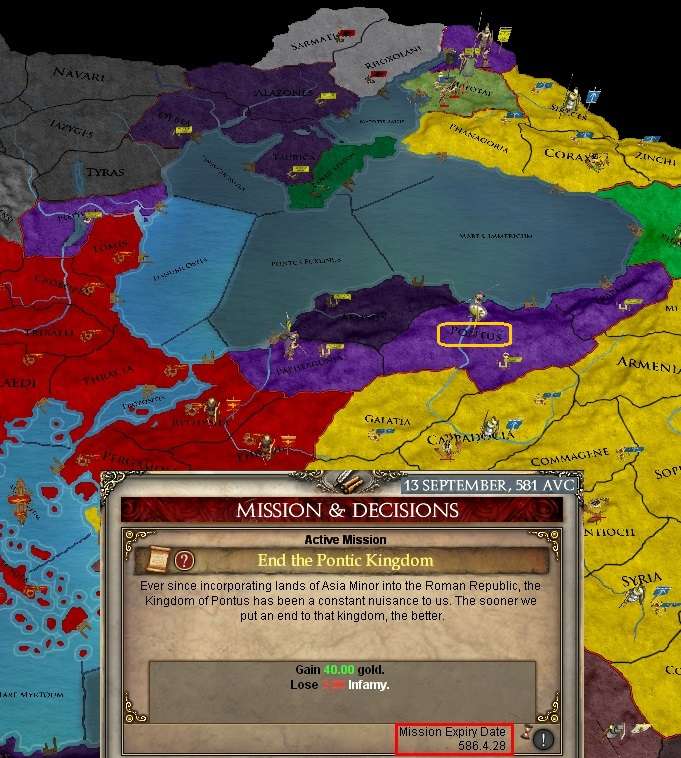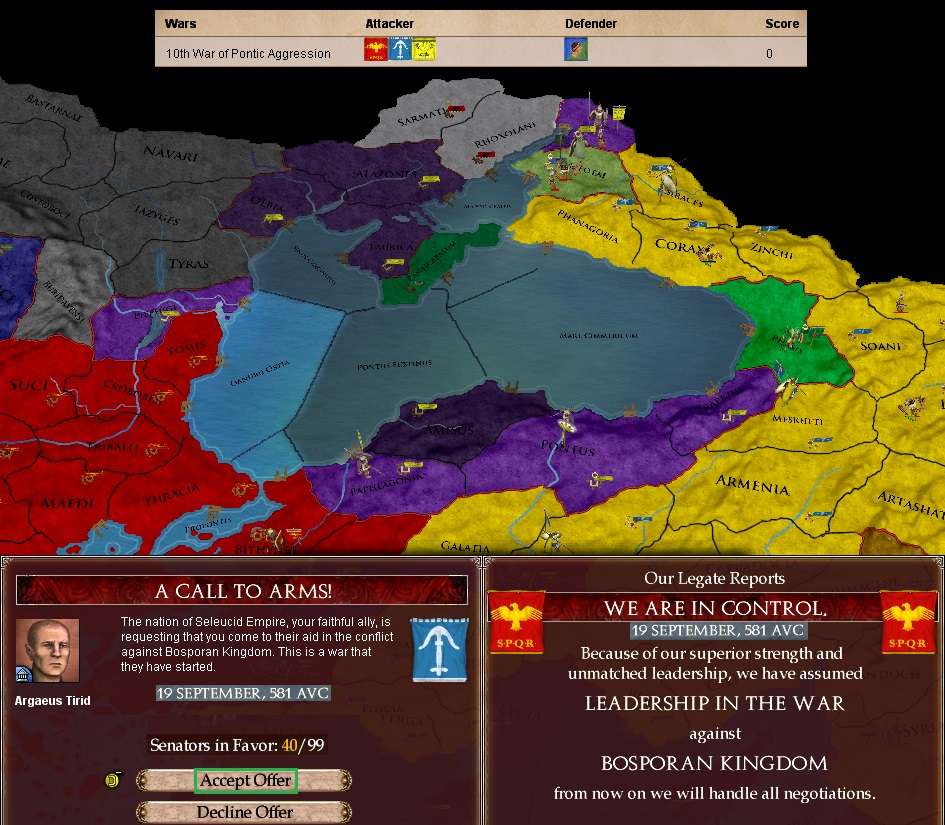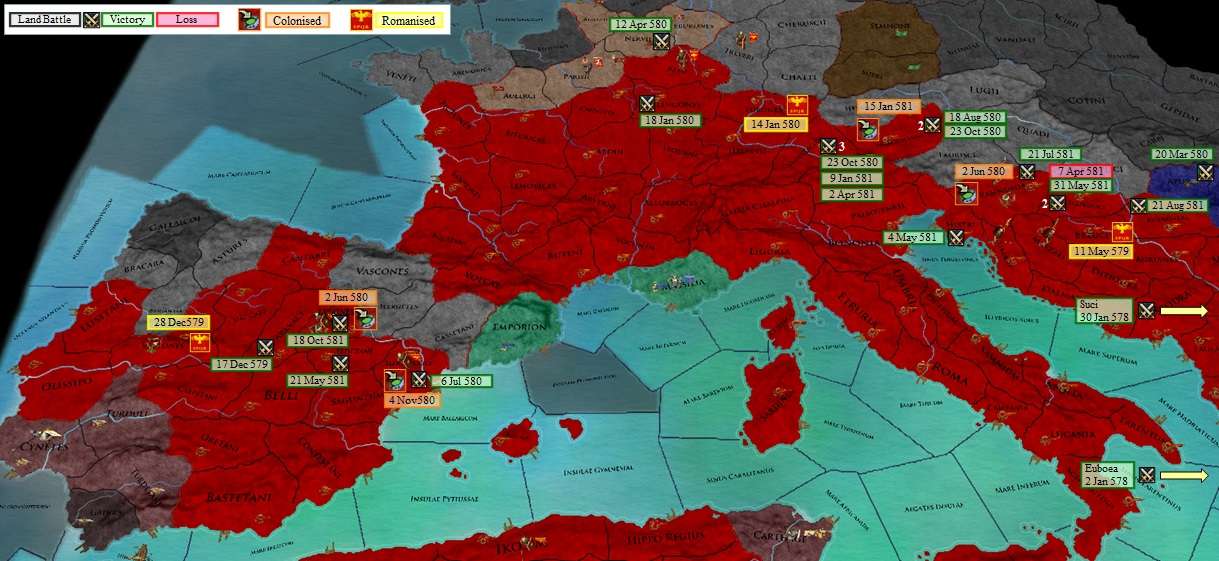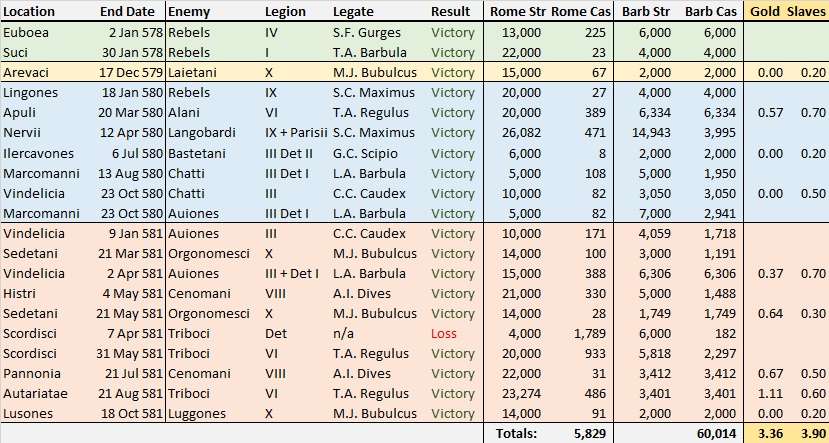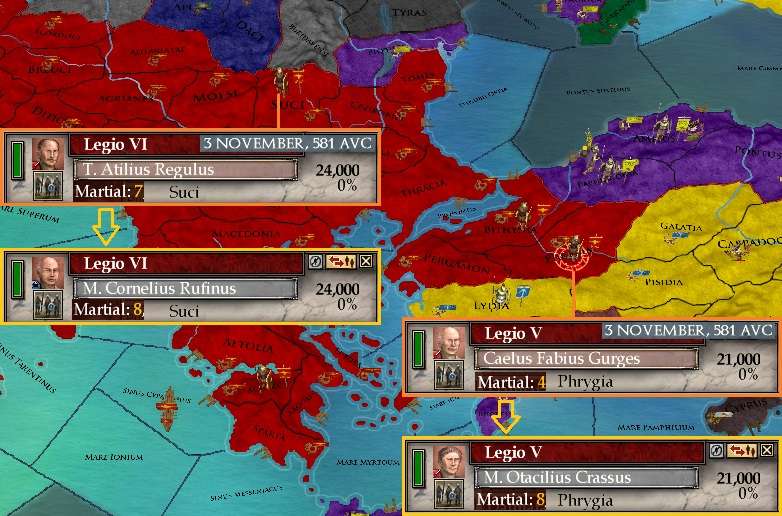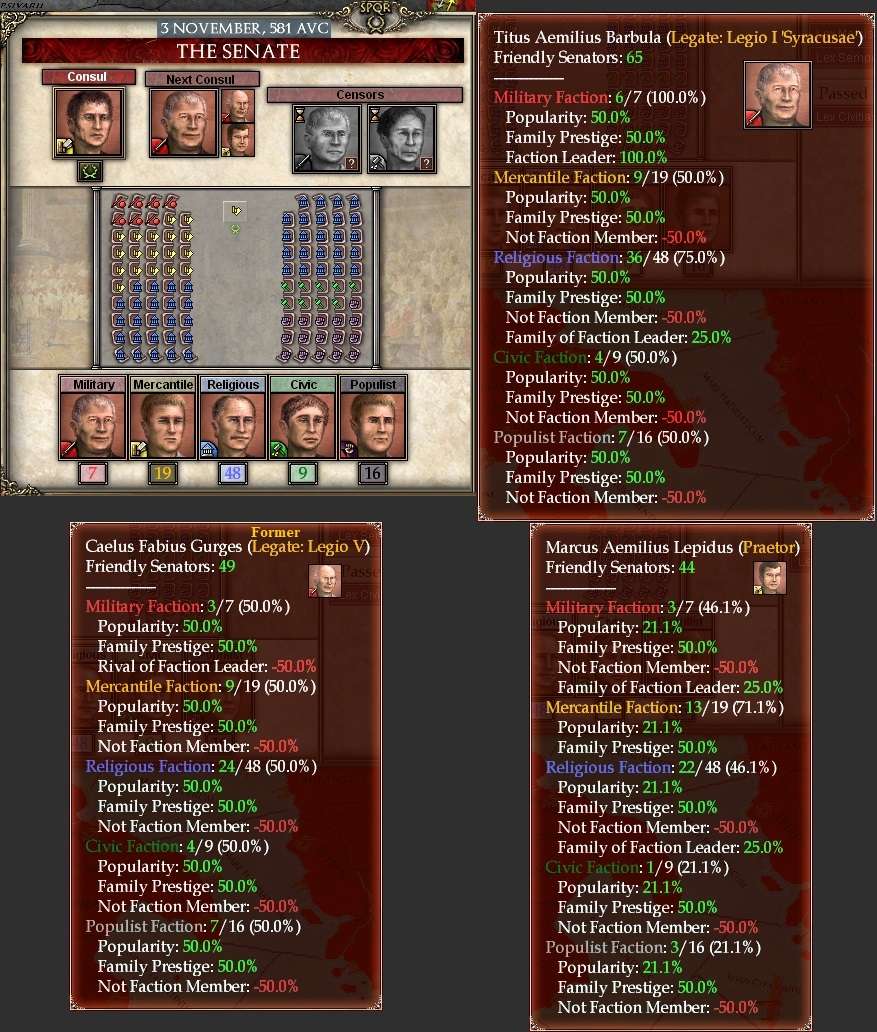Chapter XCV: Minor Distractions
(30 May 577/176 BC to 3 November 581/172 BC)
Foreword
As the
relative peace and rebuilding continues for Rome after the tremendous bloodshed of the Great Eastern War, the Republic sought to expand its settling of the barbarian West, while searching for a valid
casus belli against Pontus. Barbarian invasions and revolts have been the main 'entertainment' for Rome’s legates for a few years now, as they seek to grow the manpower reserve back to a point a major war can be safely contemplated.
§§§§§§§
June to December 577 AUC
Rome’s plans for keeping out of Eastern conflicts were soon diverted by a call to arms from their new – and important – ally: the ‘New’ Seleucid Empire. Mid-June brought a request they did not want to ignore, lest that alliance be broken.
There was no desire to bring the Rhoxolani down and Rome would not actually send any troops, the main loss being some popularity for Consul Sextus Fabius Gurges.
“So we will provide all assistance short of actual help, Consul?” asked Humphronius knowingly.
“Ah, that’s it,” said the Consul, a little sheepishly. “Get it done – or
not done, as it were.”
“Yes, Consul.”
Although Rome was now in charge of the war for the Alliance, there was too much opposition in the Senate for seeking a peace, which the Rhoxolani sought just two days later with the offer of a payment. A pity, as Gurges would have taken it if he could. The non-war would continue.
Only four days later, two troublemaking Governors were rumoured to be considering independence: Publius Carvilius Maximus of Magna Graecia and Lucius Cornelius Scipio of Raetia. Both were very expendable and not worth bribing, so were dismissed and replaced with more loyal men.
On 22 July, the old but lately disaffected campaigner G.F. Licinus died of old age. The old warhorse was now walking the Elysian Fields.
Bernardius, always afraid of revolts (as well as barbarians in general) provided the Consul with the latest assessment of revolt risks around the Republic. Predictably, the risk was highest in recently acquired or settled lands, the bulk of them in the East.
In September, Pontus made a separate peace with the Rhoxolani, gaining the province of Tanais and a small indemnity. Rome and the Seleucids remained in the war.
The fears of Bernardius were born out when he brought a note to Consul Gurges, as he attended on him in the military garrison of Legio IV (13,000 troops) in Achaea, which the Consul was personally commanding. It was a revolt by 6,000 malcontents in Euboea. The legion was soon marching east to deal with it.
November 577 saw a massive increase in the Roman navy begun – mainly designed to maintain naval superiority against the large Egyptian fleet in some future war: 16 new triremes were started in ports around the Republic. They would take up to six months to construct.
As the year drew to an end, the Senate actually made a couple of decent command suggestions for new men who were not otherwise qualified by age or rank; this tended to happen more when a war was in progress and units without commanders.
Rome’s long term tributaries, the Dacians – maintained as a buffer state on the Danube – found themselves in need of help in mid-December. Which Rome was happy enough to provide from its vast surplus in the
Aerarium.
Suci was then subjected to a revolt, with 4,000 local militia rising on 23 December. Legio I (Bribula) was sent west from nearby Crobobizi to get a little exercise after a long period of inaction.
§§§§§§§
578 AUC
The peace of the last seven months was broken when the rebels in Euboea were easily despatched by Legio IV on 2 January 578 AUC – an auspicious start to the new year. On 30 January, the rebels in Suci were slaughtered by T.A. (Bribula) Barbula’s Legio I. This useful start to the year continued, with a good harvest adding another 2,000 men to the manpower reserve on 11 February, bringing it to almost 64,000 men.
A few days later, Gurges’ term as Consul was over. His replacement would see the top magistracy return to the Religious party, under Gnaeus Servilius Caepio. A sceptical ruler who would slow down Rome’s research rate, though omens would be more likely to succeed again.
And just ten days later, A.C. Caudex was the latest to succumb to the ‘Curse of Ikosim’, though in his case foul play was not suspected. The post was left vacant, in the hope the Senate might elevate another promising candidate.
The following months were quiet, as neither barbarian invasions nor revolts trouble the Republic’s frontiers. By mid-July, two more ships were under construction in north-west Gaul, in case a small flotilla might be required for transport at some point (there would be four ships available there when they were completed). Manpower also continued to rebuild, while 15 more triremes were ordered in ports around Our Sea.
Epirus, Aetolia and Thessaly were added as core provinces of the Roman patrimony on 9 September 578. The year continued quietly, with the last notable event being another excellent military nomination by the Senate, this time for the charismatic teenage prodigy Mettius Cornelius Rufinus to take charge of Legio VII in Ikosim.
579 AUC
By mid-February 579, the loyalty of the largely idle T.A. ‘Bribula’ had become very suspect
[26%]. It took two bribes of 50 gold each to restore his enthusiasm
[+18 and +25 loyalty]. Coincidentally, within his area of responsibility, Suci and Crobobizi joined the Roman patrimony on 2 April.
As the last batch of new ships was completed, sent to build the fleet stationed in Sardinia, another 14 were laid down on 23 April. This was followed on 11 May by the successful ‘graduation’ of Breuci (in Illyria) from a colony to a fully Roman province. At the end of that month, a detachment of Legio III, then stationed in Vindelicia, was sent east to Marcomanni, which was now potentially available for colonisation:
after the local barbarians had been provoked and dispersed.
The months drifted by once more, with the next diplomatic development coming in August, when another Rhoxolani envoy bearing a peace offer was received. With the Senate now on-side, it was a chance to save the Rhoxolani from losing any more territory (this time to Rome's Seleucid allies), while trousering another 22 gold in reparations. All with not a single legionary’s life lost!
The long period of peace in northern Gaul was threatened in early September when the Parisii were invaded by a large tribe of Langobardi. They had lost Eburones to an assault and were marching east to respond, though would be heavily outnumbered. S.C. Maximus took his as-yet unnamed legion east as well, ready to fight off these barbarians should the Parisii fail to do so.
‘Bribula’ put out his hand for another ‘management commission’ on 2 November. Once more, 100 gold was handed over
[45% loyalty +22 and +16 = 83%] to keep him quiet for longer. His massacre of rebels earlier in the year had not been deemed enough to warrant a triumph.
As he marched east, Maximus (then in Bituriges) was informed that a revolt had broken out in Lingones on 1 December. He would have to divert there with the now officially renamed Legio IX before potentially moving against the Langobardi invasion, which was by then in Nervii, two provinces to the north of Lingones.
Next came a barbarian revolt on 10 December by 2,000 Laietani warriors in Arevaci (central Hispania). Legio X was already in place and crushed them within a week. Nearby, Vettones became the next colony to become a fully Romanised province on 28 December – a fine way to end the year. But the barbarian threat seemed to be stirring along Rome’s northern frontiers, after a long period of dormancy.
§§§§§§§
January to June 580 AUC
Turones became the next fully Roman province on 14 January 580, as Gaul became increasingly civilised. The good news continued a few days later with a new discovery in naval technology – which had been lagging a fair way behind the others to that point.
On 28 January, S.C. Maximus slaughtered the rebels in Lingones and then two days later marched north towards Nervii, where the Parisii had attacked but been defeated by the invading Langobardi.
That same day, settlers were sent to both Lusones (central Hispania) and to Pannonia. Both colonies were due to be founded on 30 May.
Gurges saw his quite successful term out on 12 February, to be replaced by Caelus Claudius Caudex, from the Mercantile faction. Another sceptic! He was not an impressive military man, but had good administrative skill and charisma: not too bad for a peacetime Consul. So Bernardius opined and Humphronius grudguingly agreed.
His first decision came a week later: 7,000 Alani warriors had arrived in Dacia’s undefended province of Apuli. T.A. Regulus was just to the south in Autariatae with Legio VI (20,000 men) and by 19 February was on the way to administer a good thrashing to the barbarian invaders. The battle had been fought and won by 20 March: another slaughter, with the whole tribe wiped out and its camp followers enslaved, though the Romans lost 389 men doing it.
From 2-12 April, S.C. Maximus fought almost 15,000 Langobardi warriors at Nervii, the largest battle of the current period. His arrival had been well timed, as he was joined during the battle by around 7,000 returning Parisii, bringing his numbers up to about 26,000. The battle ended in a heavy defeat for the Langobardi, but they still had over 10,000 warriors left. And the Romans were suffering a monthly decimation (ie 10% attrition), so quickly headed back south to Roman territory. The Parisii would have to look after themselves from here.
The new colonies in Lusones and Pannonia (the latter a long-held Roman objective) were founded on 2 June. The manpower reserve stood at 127,000, with a gain of 2,288 per month. In the Senate, the Religious faction was still ascendant, the Mercantile party actually edging above the Populists in numbers.
July to December 580 AUC
After years of Roman insults, parades and buttock-baring, the barbarians of Ilercavones on the eastern coast of Hispania finally rose to attack the Roman detachment. But there were only 2,000 of them, and the 6,000 troops of G.C. Scipio’s Detachment II of Legio III killed them all in five days, losing only eight men doing so. The Roman settlers were soon on their way.
While that short ‘battle’ was going, the 20 units of the Langobardi returned to attack the eight of the Parisii in Nervii on 3 July. But by 20 July the Parisii had won and were chasing the Nervii to barbarian-occupied Eburones. The earlier Roman assistance had proven sufficient and Roman respect for the Parisii grew.
Then on 3 August, 5,000 local Chatti warriors obligingly rose in Marcomanni to expel the same number of Roman troops in a detachment of Legio III that L.A. Barbula (the other one) had taken there for that very purpose many months before. The result was – of course – a trouncing for the Chatti after a ten-day fight. But just nine days after that victory, another tribe – seven regiments of Auiones – was spotted approaching from Lugii, north-east of Marcomanni, due to arrive on 13 October. Barbula (the non-bribe taking one) braced for a defensive battle.
Back in northern Gaul, the Parisii fought the Langobardi once more at Eburones on 29 August. They would win the battle by mid-September, the Langobardi fleeing north while the Parisii stayed to retake their occupied province, rather than chase the barbarian attackers.
By 12 September, the Chatti had retreated to Hermunduri and turned back, but this time to Vindelicia. The rest of Legio III waited there, without a commander as L.A. Barbula remained in Marcomanni, awaiting the attack of the Auiones. So Consul Caudex himself, although only a mediocre commander
[Martial 3], took over the troops waiting in Vindelicia. This also meant there was a window to send the settlers into Marcomanni, with no barbarians currently within its borders.
On 23 October, Rome recorded two victories in adjacent provinces. Caudex slaughtered the rest of the Chatti in Vindelicia, while L.A. Barbula had an easy victory against the numerically superior Auiones in Marcomanni. All Rome's generals were proving very efficient during this period, admittedly against predominantly smaller barbarian bands than many they had encountered in the past.
The new colony in Ilercavones (Hispania) was founded on 4 November 580 with (as always) a stockade soon being built. Later that month, Bribula took his cut of 50 gold
[45% +21 = 66% loyalty]. As he had the largest following of personally loyal troops, he was the only Roman general who required such generosity to keep him sweet.
In early December, three new cohorts of archers were raised in the Illyrian region, to balance Dives’
principes-heavy Legio VIII. These troops would later receive an unexpected baptism of fire!
§§§§§§§
January to June 581 AUC
The Auiones had also retreated north after their loss in Marcomanni and made for Vindelicia, where Consul Caudex awaited them. They attacked him on 4 January and he soundly defeated them five days later. During the battle, this military novice had learned enough to add a valuable tactical skill to his repertoire: he was living the dream as a Roman military hero when he had never expected to do so.
The rally event is a particularly useful one, regenerating morale during a long battle.
Six days later, the latest Roman colony was founded in Marcomanni. The Romans intended to put this
interbellum period to the best use they could.
A small barbarian revolt in Sedetani (central Hispania) by a 3,000 man band of the Orgonomesci broke out on 9 February to provide a slight interruption, but Legio X was soon headed their way with a fistful of Roman justice to administer.
But the trend of barbarian activity was picking up: by 22 February another, a reinforced group of the Auiones was on its way to Vindelicia, with 11 units this time. Caudex was becoming quite the veteran as he waited for them to arrive – and for L.A. Barbula to rejoin Legio III with his detachment from Marcomanni.
Over the last four years, the omens had been consulted when called for. When the auspices seemed good, Minerva was invoked. When the chances looked worse, the Consul would risk his own popularity rather than further impede Roman research by invoking Jupiter instead. This policy paid off (part luck, part good management) between 578 and 581.
The Orgonomesci were duly defeated in Sedetani on 29 March 581, but would be back for another try in due course. And the day that battle ended, a barbarian revolt by 5,000 Cenomani warriors erupted in Histrii. Then from 31 March to 2 April, C.C. Caudex started the battle against the Auiones in Vindelicia, which L.A. Barbula finished after reinforcing, with all 6,306 barbarians wiped out for 388 Roman casualties.
The area was now a hive of activity, however: 4,000 Roman reinforcements making they way along the border between legions was very unluckily ambushed by a band of 6,000 Triboci who had revolted in Scordisci on 2 April! The Romans, without a commander, retreated as soon as they could, but had lost 1,789 legionaries before they could escape on 7 April. It would be the only Roman defeat during the entire
interbellum period.
T.A. Regulus and the 20,000 men of Legio VI in Autariatae were immediately sent west to teach the Triboci a harsh lesson. At the time, many Roman legions were in motion, as a reorganisation of border assignments was under way – in part to try to give Bribula some proper battle time so a triumph might be arranged (far cheaper and more effective than bribes). Dives was on his way with Legio VIII to crush the rebellion in Histrii.
Legio VIII duly beat the Cenomani in Histrii between 29 April-4 May, but the barbarians put up s stiff fight, killing over 300 Romans and avoiding complete destruction. In Sedetani, the Orgonomesci were not so fortunate, wiped out by Legio X on 21 May when they returned to another forlorn attack. And then Regulus fell upon the Triboci on 25 May, but attacking across a river and running into a tough barbarian defence. He won by 31 May, but lost over 900 of his own men in killing about 2,300 of the enemy.
§§§§§§§
July to October 581 AUC
Legio VIII had pursued the Cenomani to Pannonia and this time destroyed them in a single day, killing over 3,400 barbarians for only 31 more men lost.
Next followed an alert that the Triboci had retreated to Autariatae on 9 August and were besieging it. But Regulus was in pursuit, the final reckoning coming on 21 August with the destruction and enslavement of the Triboci and final Roman revenge on the upstarts. This signalled a quieter period in that region for the next few months, after a frantic time of chasing barbarian rebels and invaders.
Diplomatic events now began to assert greater importance once more. At the end of August 581, it seems Pontus had decided to grab the remaining province of the Bosporan Kingdom. Bingo! This finally gave Rome the
casus belli they had been searching for. The Senate would have granted a declaration of war immediately, but there was still uncertainty about what the Seleucid Empire might do (being allied with both Rome and Pontus). And the Roman forces in the East were somewhat out of position at that time.
So no declaration was made. But Rome started making moves to prepare for one. First, Classis IV was sent around to be ready to embark Legio IV from Achaea, for use on either Crete or Rhodes, both Pontic possessions.
In mid-September, Bernardius reminded Consul Caudex that the Senate’s grandly titled mission to ‘end the Pontic Kingdom’ remained extant, with the deadline of 28 April 586 still some way off, but getting closer. To fail
this one would destabilise the Republic.
As Rome re-positioned its forces for an option of war against Pontus, the alliance with the Seleucids once more drew them reluctantly into a war – with the Bosporans. Again, the Consul took a popularity hit to support their allies: if it came to war with Pontus, anything possible would be done to either keep the Seleucids out of it, or even bring them in on Rome’s side.
The Luggones rose in the recently settled Lusones (central Hispania) on 1 October: but Legio X was still there in garrison. After a desultory fight that lasted until mid-month, Bubulcus had wiped out all 2,000, for only 91 Romans killed.
This marked the last battle of the period. A map of the major battles, colonisations and provincial declarations between June 577 and October 581 is provided below
Plus a table of all the battle details, including total casualties – which were generally very heavily in Rome’s favour.
3 November 581 AUC
Legio VI arrived in Suci on 3 November 581 – bringing it next to the Pontic province of Pephigi, at the mouth of the Danube. The Pontic 1st Stratos was heading east to the province of Pontus – and the
casus belli still held, despite the fact both realms were now at war with the Bosporans. Three more legions were heading back east: one (Legio VIII) would probably be retained to patrol the troublesome Danube frontier from Marcomanni through to Autariatae. The other two (I and IX) would most likely keep moving east to be used in a possible war on Pontus – and be ready if the Seleucids unexpectedly supported Pontus if Rome attacked the latter. Legio IV remained ready for naval landings in the Eastern Mediterranean.
In Roma itself, the
cursus honorum was again employed to advance new military commanders, with Albinus promoted from Pontifex to Censor, the other new Censor being picked for his administrative ability. Another brilliant young military officer with a famous name but no personality, M.C. Maximus, was the new Pontifex.
The promising young M.C. Rufinus, recently promoted by the Senate to command Legio VII in Ikosim, was moved out of that posting for redeployment to the East, leaving Legio VII's command vacant once more. He took over Legio VI in Suci, replacing T.A. Regulus. The lacklustre C.F. Gurges was replaced as commander of Legio V in Phrygia, on the border with Pontus, by M.O. Crassus.
The competent and already ‘blooded’ Regulus was compensated with the command of the ten cohorts in Remi (the balance of Legio III), with Consul C.C. Caudex relinquishing his position.
In Roma, with the next Consular election due the following February, none other than T.A. Barbula (the current Military faction leader) was the hot favourite for the post. It would be good for any potential major war effort if he won. Recently ‘retired’ Legate of Legio V, C.F. Gurges (also from the Military faction), was running second, while the Praetor M.A. Lepidus from the Religious party was a close third.
The Mercantile faction was now the second most numerous party after the dominant Religious group, with the Civic and Military factions a distant fourth and fifth.
And thus stood the Republic, as it remained poised for a possible war of aggression against the old enemy Pontus. With consequences that could only be guessed at if the Seleucids reacted differently than Rome hoped.
§§§§§§§
Finis





